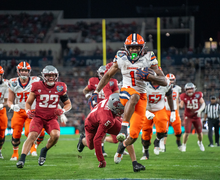Out-of-state first-time voters share what made them cast absentee ballots at SU
Meghan Hendricks I Photo Editor
First-time voters at Syracuse University are casting out-of-state absentee ballots to execute their civic duty.
To support student journalism and the content you love, become a member of The Daily Orange today.
Instead of standing in a voting booth in a high school gym or civic center, Syracuse University freshman Alexandra Brownstein voted for the first time this fall by dropping an envelope into a mailbox.
Brownstein, who lives in Virginia, was among many SU students from outside of New York voting for the first time in Tuesday’s midterm elections. As 55% of SU students come from states outside of New York, many voted using absentee ballots. Each state has distinct regulations about mail-in ballots and who qualifies as an absentee, which affected how SU students chose to vote.
“(Voting) really is, in a country this big, the fundamental core of the democracy,” said Grant Reeher, the director of the Campbell Public Affairs Institute and a political science professor at SU. “I just can’t stress enough how important it is for all of us as adult citizens.”
Brownstein said she found voting by mail straightforward. Within a week of registering, she received her ballot, which she sent that night.
But some states have more complicated requirements to request a mail-in ballot. Logan Onken, a freshman from Minnesota, needed either a registered voter from Minnesota or a notary to serve as a witness for her ballot.
“It took several days to find someone to do that for me, which is kind of a struggle, and I can see how it can prevent people from doing it because it took so long to find someone,” Onken said.
Unlike Onken, freshman Eric Finley, who lives in South Carolina, ultimately decided not to go through the application process after looking into his state’s requirements.
“To get a ballot, it’s sending things in the mail basically three or four times,” Finley said. “Being so far away on a college campus, it’s not impossible, but it’s very inconvenient if I wanted to vote in my own state.”
Although SU students can register to vote in Onondaga County, Finley chose not to because he feels more politically connected to his home state.
“(New York is) not the state that I’ve grown up listening to different candidates speak (in). That’s not the state I get political ads from,” Finley said. “It’s not the state that I’ve lived in my whole life.”
Regardless of where they cast their ballot, students said they are invested in the outcome of this cycle’s midterms. In June, the Supreme Court effectively overturned the 1973 Roe v. Wade decision, which held that the Constitution guarantees the right to an abortion.
In response, five states — California, Vermont, Michigan, Kentucky, and Montana — have ballot measures about abortion on the ballot this November.
“This is a big election for me and for a lot of women regarding our reproductive rights,” Brownstein said.
Andrea Vigliotti, a sophomore from central New York who voted in person, urged her peers not to let lack of knowledge about the logistics of the voting process discourage them from voting. During the 2o18 midterm elections, 28.2% of people aged 18-29 voted, according to Tufts University’s Center for Information and Research on Civic Learning & Engagement.
“I know voter turnout can be low among younger voters because they’re scared to vote and they haven’t really done it before and it seems like there’s barriers to voting, but all you have to do is just sign up and show up. It’s just as easy as that,” Vigliotti said.
Shana Gadarian, professor and the chair of the political science department at SU, said that the youngest generation of voters is more diverse than previous generations, and their votes typically benefit the Democratic party.
“More robust turnout (from the younger generation) might mean the Democrats who are likely to lose control of the House may lose fewer seats than they would have lost if young people had stayed home,” Gadarian said.
Zac Weintraub, a freshman who voted while he was visiting home in North Carolina, also expressed that voting for the first time felt like having a voice in the conversation.
“It felt like I actually did something,” Weintraub said. “It felt good to know that there is a system out there that lets us have a voice, lets us have a say.”

Published on November 8, 2022 at 11:39 pm
Contact Claire: charri39@syr.edu





